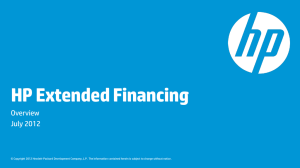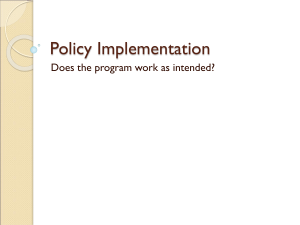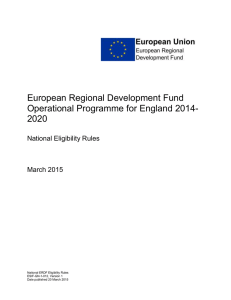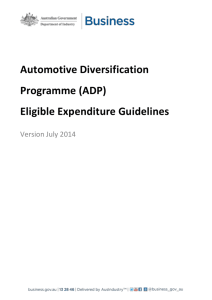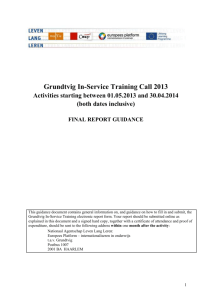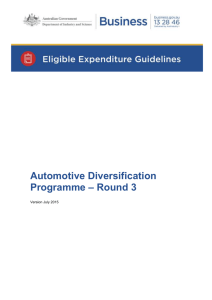Infrastructure and works
advertisement
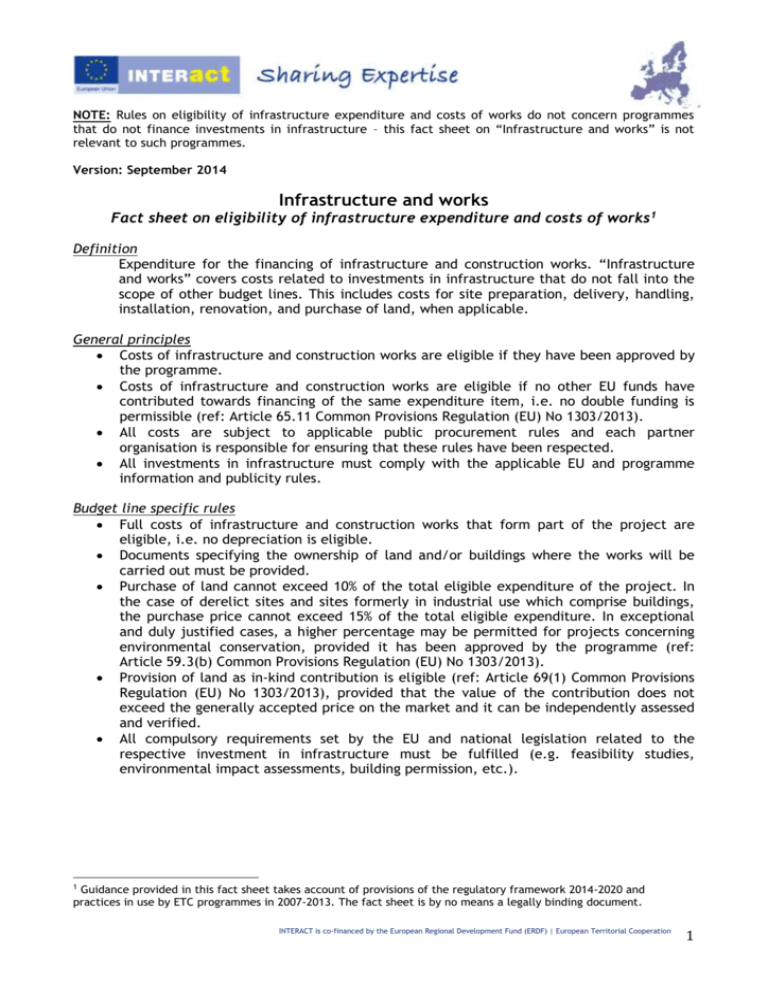
NOTE: Rules on eligibility of infrastructure expenditure and costs of works do not concern programmes that do not finance investments in infrastructure – this fact sheet on “Infrastructure and works” is not relevant to such programmes. Version: September 2014 Infrastructure and works Fact sheet on eligibility of infrastructure expenditure and costs of works1 Definition Expenditure for the financing of infrastructure and construction works. “Infrastructure and works” covers costs related to investments in infrastructure that do not fall into the scope of other budget lines. This includes costs for site preparation, delivery, handling, installation, renovation, and purchase of land, when applicable. General principles Costs of infrastructure and construction works are eligible if they have been approved by the programme. Costs of infrastructure and construction works are eligible if no other EU funds have contributed towards financing of the same expenditure item, i.e. no double funding is permissible (ref: Article 65.11 Common Provisions Regulation (EU) No 1303/2013). All costs are subject to applicable public procurement rules and each partner organisation is responsible for ensuring that these rules have been respected. All investments in infrastructure must comply with the applicable EU and programme information and publicity rules. Budget line specific rules Full costs of infrastructure and construction works that form part of the project are eligible, i.e. no depreciation is eligible. Documents specifying the ownership of land and/or buildings where the works will be carried out must be provided. Purchase of land cannot exceed 10% of the total eligible expenditure of the project. In the case of derelict sites and sites formerly in industrial use which comprise buildings, the purchase price cannot exceed 15% of the total eligible expenditure. In exceptional and duly justified cases, a higher percentage may be permitted for projects concerning environmental conservation, provided it has been approved by the programme (ref: Article 59.3(b) Common Provisions Regulation (EU) No 1303/2013). Provision of land as in-kind contribution is eligible (ref: Article 69(1) Common Provisions Regulation (EU) No 1303/2013), provided that the value of the contribution does not exceed the generally accepted price on the market and it can be independently assessed and verified. All compulsory requirements set by the EU and national legislation related to the respective investment in infrastructure must be fulfilled (e.g. feasibility studies, environmental impact assessments, building permission, etc.). 1 Guidance provided in this fact sheet takes account of provisions of the regulatory framework 2014-2020 and practices in use by ETC programmes in 2007-2013. The fact sheet is by no means a legally binding document. INTERACT is co-financed by the European Regional Development Fund (ERDF) | European Territorial Cooperation 1 Audit trail The following main documents must be available for control purposes: 1. Evidence of the procurement process (announcement, selection, award) in line with the national procurement rules or the EU procurement rules depending on the amount of the contract. 2. Contract laying down the works/infrastructure to be provided, with clear reference to the project and the programme. For contracts based on a daily fee, such fee together with the number of days contracted and the total amount of the contract must be provided. 3. Invoice providing all relevant information in line with the applicable accountancy rules. 4. Proof of payment. List of eligible and ineligible costs Examples of costs eligible under this budget line are listed in the INTERACT Matrix of costs. Information on ineligible costs is also provided. Please refer to the abovementioned document. Programme-specific conditions Rules on eligibility of infrastructure expenditure and costs of construction works do not apply to programmes that do not finance investments in infrastructure – this fact sheet does not concern such programmes. In the case of purchase of land and real estate, some programmes may require a document explaining a direct link between the purchase and objectives of the project, and/or a certificate from an independent qualified expert confirming that the purchase price does not exceed the market value. The monitoring committee of the programme may establish that no in-kind contribution is eligible under this budget line. INTERACT is co-financed by the European Regional Development Fund (ERDF) | European Territorial Cooperation 2






